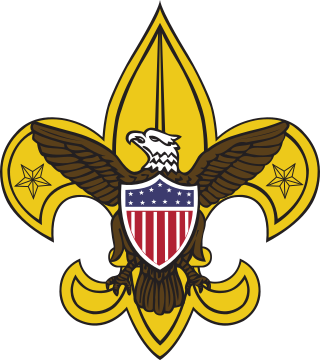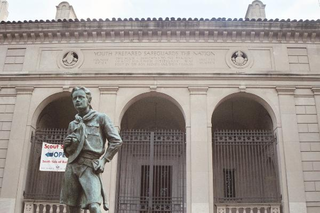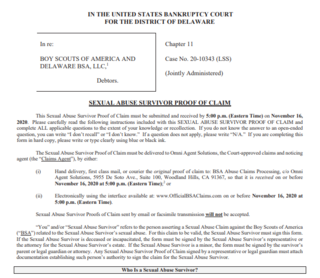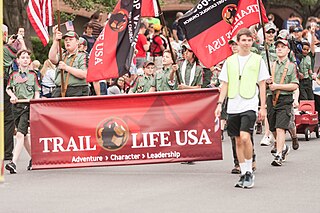
The Boy Scouts of America is the largest scouting organization and one of the largest youth organizations in the United States, with over 1 million youth, including 176,000 female participants. The BSA was founded in 1910; about 130 million Americans have participated in its programs, which are served by 477,000 adult volunteers. BSA became a founding member organization of the World Organization of the Scout Movement in 1922.
Boy Scouts of America et al. v. Dale, 530 U.S. 640 (2000), was a landmark decision of the US Supreme Court, decided on June 28, 2000, that held that the constitutional right to freedom of association allowed the Boy Scouts of America (BSA) to exclude a homosexual person from membership in spite of a state law requiring equal treatment of homosexuals in public accommodations. More generally, the court ruled that a private organization such as the BSA may exclude a person from membership when "the presence of that person affects in a significant way the group's ability to advocate public or private viewpoints". In a 5–4 decision, the Supreme Court ruled that opposition to homosexuality is part of BSA's "expressive message" and that allowing homosexuals as adult leaders would interfere with that message.
The Boy Scouts of America (BSA), one of the largest private youth organizations in the United States, has policies which prohibit those who are not willing to subscribe to the BSA's Declaration of Religious Principle, which has been interpreted by some as banning atheists, and, until January 2014, prohibited all "known or avowed homosexuals", from membership in its Scouting program. The ban on adults who are "open or avowed homosexuals" from leadership positions was lifted in July 2015.

William Hillcourt, known within the Scouting movement as "Green Bar Bill", was an influential leader in the Boy Scouts of America (BSA) organization from 1927 to 1992. Hillcourt was a prolific writer and teacher in the areas of woodcraft, troop and patrol structure, and training; his written works include three editions of the BSA's official Boy Scout Handbook, with over 12.6 million copies printed, other Scouting-related books and numerous magazine articles. Hillcourt developed and promoted the American adaptation of the Wood Badge adult Scout leader training program.
Curran v. Mount Diablo Council of the Boy Scouts of America, 17 Cal.4th 670, 952 P.2d 218, 72 Cal.Rptr.2d 410 (1998), was a landmark case which upheld the right of a private organization in California to not allow new members on the basis of their sexual orientation. Its companion case was Randall v. Orange County Council, 17 Cal.4th 736, 952 P.2d 261, 72 Cal.Rptr.2d 453 (1998).

Scouts BSA is the flagship program and membership level of the Boy Scouts of America (BSA) for coeducational young people between the ages of typically 11 and 17. It provides youth training in character, citizenship, personal fitness, and leadership, and aims to develop the skills necessary to become successful adults.

Barnes-Wallace v. Boy Scouts of America was a case involving the City of San Diego's relationship with the Boy Scouts of America.
Evans v. Berkeley was a court case which upheld the right of governmental entities in California to withhold support from non-profit organizations that practice discrimination on the basis of sexual orientation.

Scouting in the United States is dominated by the 1.2 million-member Boy Scouts of America and the Girl Scouts of the USA and other associations that are recognized by one of the international Scouting organizations. There are also a few smaller, independent groups that are considered to be "Scout-like" or otherwise Scouting related.

The Boy Scouts of America (BSA) was inspired by and modeled on The Boy Scouts Association, established by Robert Baden-Powell in Britain in 1908. In the early 1900s, several youth organizations were active, and many became part of the BSA.

There are various controversies and conflicts that involve the Scouting movement. Scouting has sometimes become entangled in social controversies such as in nationalist resistance movements in India. Scouting was introduced to Africa by British officials as an instrument of colonial authority but became a subversive challenge to the legitimacy of British imperialism as Scouting fostered solidarity amongst African Scouts. There are also controversies and challenges within the Scout Movement itself such as current efforts to turn Scouts Canada into a democratic organization.
Ben H. Love was the eighth Chief Scout Executive of the Boy Scouts of America serving from 1985 to 1993. Love graduated from Peabody High School and Lambuth College. He served in the U.S. Army during the Korean War and attained the rank of sergeant. Love died on July 31, 2010, at his home in Cedar Park, Texas due to lung cancer.

Lesbian, gay, bisexual, transgender, and queer (LGBTQ) people in the U.S. state of New Jersey have the same legal rights as non-LGBTQ people. LGBT individuals in New Jersey enjoy strong protections from discrimination, and have had the same marriage rights as heterosexual people since October 21, 2013.

Scouts for Equality (SFE) is an American advocacy organization that advocates for equal treatment within the Boy Scouts of America (BSA) for all scouts and scout leaders, regardless of sexual orientation. On July 17, 2012, the BSA reaffirmed a policy, first established in 1991, which prohibited "known or avowed" gay scouts and scout leaders from participating in the organization.

The Boy Scouts of America (BSA) is one of the largest youth organizations in the United States, with 2.3 million youth members and approximately 889,000 adult volunteers in 2017. In 1979 there were over 5 million youths in BSA.

Trail Life USA is a faith-based Scout-like organization providing youth mentorship and character development to boys in the United States. The organization was founded in 2013 in reaction against the Boy Scouts of America (BSA) changing its membership policy to allow homosexual youth in boy scout packs. As of early 2024, Trail Life has grown to over 60,000 members. All charters of Trail Life USA must pledge to follow its "Statement of Faith"; the organization is Trinitarian Christian. Youths of all or no religious beliefs are allowed to join, but individual Charter Organizations may limit Troop membership to boys of a certain faith or membership in a certain organization.

In the Boy Scouts of America, a Scout leader refers to the trained leaders of a Scout unit. Adult leaders are generally referred to as "Scouters," and the youth leaders are referred to by their position within a unit. In all Scouting units above the Cub Scout pack and units serving adolescent Scouts, leadership of the unit comprises both adult leaders (Scouters) and youth leaders (Scouts). This is a key part of the Aims and Methods of Scouting. In order to learn leadership, the youth must actually serve in leadership roles.

Scout's Honor is a 2001 American documentary film directed by Tom Shepard and written by Meg Moritz. Appearing as themselves in the documentary are Steven Cozza, James Dale, Tim Curran, Dave Rice and Scott and Jeanette Cozza. The film examines the Boy Scouts of Americas (BSA) policy against gays in the organization. It focuses on Steve Cozza and Dave Rice who join together to fight against the policy, and also relates the stories of two gay men who were expelled from the organization, and fought back in the courts. The film premiered at the Sundance Film Festival on January 25, 2001, where it won an Audience Award for Best Documentary, and director Tom Shepard won a Freedom of Expression Award. The documentary had additional screenings at several other film festivals where it received multiple awards, and it also received a GLAAD Media Award for Outstanding Documentary. The film aired nationally on the PBS series POV on June 19, 2001.

Outdoor Service Guides (OSG) is an inclusive, co-ed scouting organization in the United States. OSG accepts scouts without regard to gender, gender identity, race, sexual orientation, economic circumstances, religion, or other differentiating factors. OSG seeks to welcome communities who have been traditionally underserved by Scouting, including LGBTQIA+, BIPOC and females.













